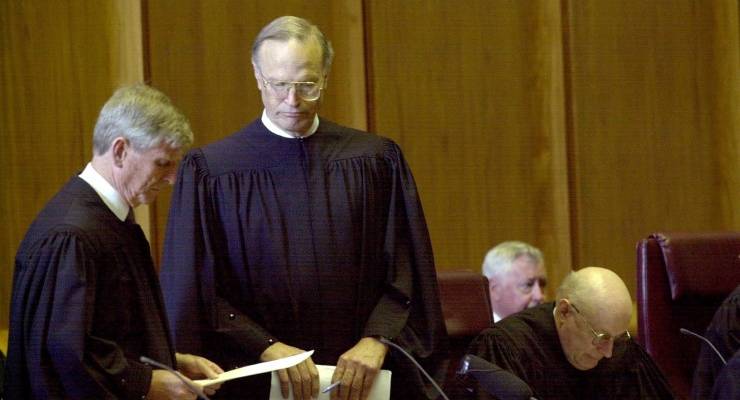
On Monday afternoon, Sydney Morning Herald journalists Kate McClymont and Jacqueline Maley dropped a bombshell: one of Australia’s former top judges, Dyson Heydon, had been accused of sexually harassing a range of young, female associates, and an independent High Court inquiry had proved it.
McClymont and Maley had known about similar allegations for years but, thanks to stringent defamation laws, the prominence of Heydon, and women worried about going on the record, they hadn’t been able to call out the former High Court judge until now.
How did the allegations come to light?
The allegations emerged when McClymont was investigating allegations into former TV personality Don Burke and actor Craig McLachlan back in 2017.
“We did our absolute best [to report the Heydon story], but for various reasons and seeing what was happening with Geoffrey Rush we just did not have enough information,” McClymont told Crikey.
McLachlan also launched defamation proceedings against the ABC and SMH, which have been delayed. Geoffrey Rush was awarded $2.9 million in damages following allegations by The Daily Telegraph.
Heydon was an expert in evidence law, a Companion of the Order of Australia, a former royal commission chief and a Sydney University law dean.
At the time, the reporters had just two women on the record and several anonymous complainants. They spent months investigating the story, interviewing more than 20 people across the US, UK and Australia.
“This story has been the hardest to do because the legal profession is such a male-dominated field. People felt their careers would suffer,” McClymont said.
What pushed the story over the line?
In March 2019, two complainants approached Chief Justice Susan Kiefel, High Court spokesman Ben Wickham told Crikey.
“The court acted immediately to commission Vivienne Thom to conduct an independent inquiry,” he said. Thom is the former inspector-general of intelligence and security, and interviewed a dozen witnesses.
Some “to and froing” between the High Court and the two complainants’ lawyers from Maurice Blackburn around the terms of reference meant the investigation “took a while to get going,” Wickham said. But once it did, it became apparent the allegations were more widespread than first thought.
There were six women willing to go on record with the High Court about complaints during Heydon’s tenure at the High Court between 2003 and 2013. Maurice Blackburn’s Josh Bornstein said three of the women would pursue claims for compensation.
“Dyson Heydon’s repeated sexual harassment of young women who were starting out their legal careers was known to many people and has caused significant harm and trauma to my clients,” Bornstein said.
“Heydon’s power and influence was such that even where informal complaints were raised with senior members of the court, the behaviour did not stop.”
Speed and Stracey lawyers representing Heydon said he “denies emphatically any allegation of sexual harassment or any offence”.
Some media reports have alleged Heydon was not granted procedural fairness during the investigation, which Bornstein denies. “This is a ridiculous suggestion … Heydon himself was at all times also being advised by experienced lawyers,” he said.
McClymont said the inquiry was the push needed for more women to come forward. “The High Court doing its own internal inquiry, which women shared with me — that gave us the impetus,” she said.
In their story, Maley and McClymont tell the experiences of four named women — including prominent lawyer Noor Blumer, who alleged assault and harassment at University of Canberra’s annual law ball in April 2013 — and the experiences of six unnamed women.
Some women had left the law profession after their run-ins with Heydon.
Maley said the story had been difficult to cover. “The defamation threat is strong, you’ve got politicians and people in government with strong views … and we have a strong obligation to protect women, especially the confidential ones.”
What’s next?
Since the story was published, McClymont said the floodgates had opened.
“You have to gain people’s confidence,” she said. “People who were initially hesitant to get back to you. More people have come forward.”
Maley said her phone had blown up. “The response has been pretty overwhelming.”
Not only have prominent law professionals shared their experience and opinions, but so too had politicians. Their calls are outnumbered by women calling to thank the duo for their coverage.
More stories alleging assault at Oxford University are expected to be published tomorrow.








Crikey encourages robust conversations on our website. However, we’re a small team, so sometimes we have to reluctantly turn comments off due to legal risk. Thanks for your understanding and in the meantime, have a read of our moderation guidelines.